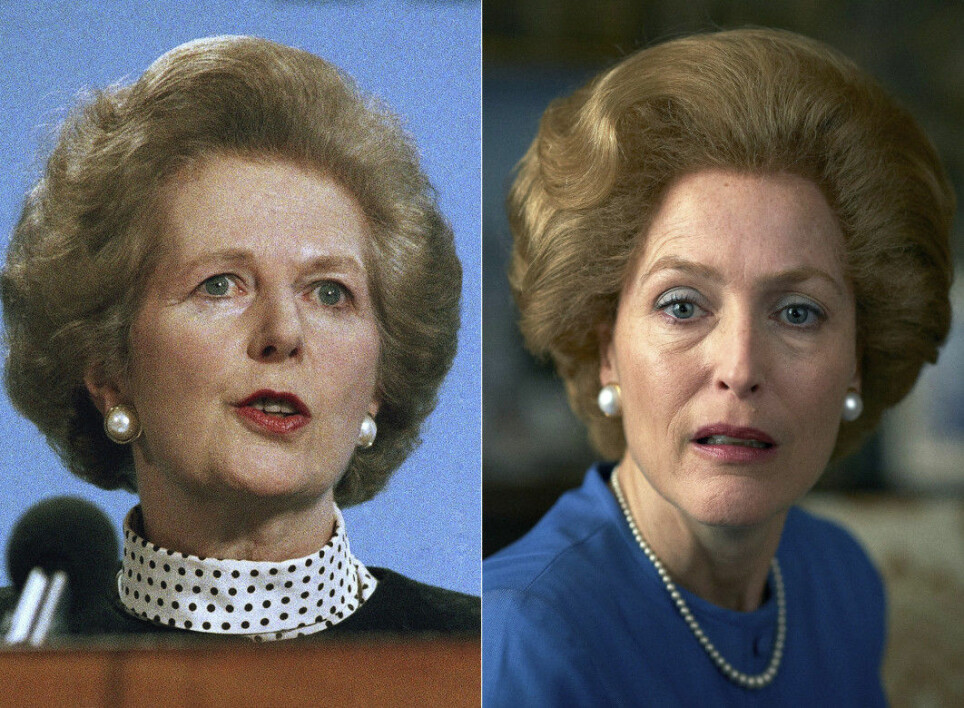
Netflix triumphs over the history books. Our brain remembers what we see on the screen better than what we read
The Crown and the new Norwegian series Atlantic Crossing are fiction, not fact. But research shows that viewers remember them as factual. One Norwegian historian argues that the series creators need to take responsibility for this misperception.
Shows like The Crown on Netflix and Atlantic Crossing on the Norwegian Broadcasting Corporation (NRK) have been widely criticized for reconstructing history.
Events that happen on the screen don’t actually correspond to reality.
In Atlantic Crossing, Crown Princess Märtha convinces the American president to join World War II. In reality, she almost certainly didn’t.
In The Crown, Margaret Thatcher's son was reported missing in a car race at the same time as the escalation of the Falklands War. This makes the days leading up to the war even more dramatic for Thatcher. But in the real world, her son actually disappeared months earlier. He had returned home safely when the war began.
How dangerous is it to embellish the truth in a TV series? Do viewers know what really happened, and that what they see on the screen is fiction?

TV, streaming and movies easier to remember than books
Maybe not. Research shows that we’re better at remembering what we see on screen than what we read.
“Films and series provide several pathways into our memory,” says Annika Maria Melinder, a professor of psychology at the University of Oslo.
“When we see things, our brain encodes what we see, hear and feel,” she said.
When we want to remember what happened, the experience of seeing something gives the brain many avenues to bring the memories back. That makes it easier to remember pictures, sounds or scenes we recognize. Emotions also help us remember better. If we are angry, shocked or touched by something we see on screen, it also becomes easier to remember those scenes.
“Movies and TV shows serve us memories on a silver platter,” says Melinder.
When we read a text, on the other hand, such as history books at school, the road into our memory is considerably narrower.
“Reading requires more energy and cognitive capacity. First you need to identify the letters, and put them together into words and sentences so that they make sense. The process is more demanding and takes a good deal of our attention,” says Melinder.
What’s the difference between The Crown and Atlantic Crossing?
Einar Lie is a professor of history at the University of Oslo. He has been involved in the debate over NRK's portrayal of the Crown Princess's relationship with Roosevelt.
Lie thinks it's sometimes okay to change historical events in series and movies.
“You often have to make small changes for dramatic purposes,” he says.
When Diana seeks out Queen Elisabeth and asks for help in dealing with her life as a new princess in The Crown, no one can really know what was said. Only the two were present.
In that case, it may be acceptable to resort to interpretations and speculation, Lie said.
“But sometimes we end up with a completely incorrect picture of historical events,” he said.
“And there’s no way to get beyond the fact that TV shows, which reach hundreds of thousands of viewers, have a much greater influence than textbooks and the work historians write,” he said.

Strong royals and weak politicians
Is it really a problem if our understanding of history is incorrect?
“No, not for specific, concrete events,” Lie says.
Like when producers postponed Margaret Thatcher's son's disappearance for a few months to create more drama in The Crown.
“It’s often completely reasonable to alter specific events. But then you have to have an awareness of what kind of historical understanding you create in the people who are sitting and watching it,” Lie said.
He thinks that series creators need to take responsibility for how we as the audience understand the history in question.
“When the royals are portrayed as people with unique strategic abilities, politicians are portrayed as weak or directionless, and clear-minded generals are put somewhere in between, as in Atlantic Crossing, I think it becomes problematic,” says Lie.
“It can certainly build up perceptions of the royalty, but it’s at the expense of democratic institutions, strictly speaking,” he said.
American research on memory
An American study from 2009 supports both Melinder and Lie’s assessment that we remember things better when we see them on film.
The study included 108 subjects who were divided into groups. They got to see clips from nine different movies at the same time as they were given nine short academic texts on the same topic. Some events in the films were untrue and contradicted what had actually happened, while the texts contained factual information about the story.
When the subjects were asked to retell the story, almost half of them remembered the incorrect information from the film.
Some of those who answered incorrectly even said that they had read the information in the subject text, which only contained correct facts.
Do warnings help?
The royal family’s criticism of The Crown has led English authorities to now ask Netflix to post a warning before each episode. This warning will inform viewers that the historical drama they’re about to see is not based on facts.
Lie thinks this may help a little.
“In any case, it pulls in the opposite direction of the marketing, where the series creators emphasize that they have something extraordinary to bring to our understanding of past events,” he said
Researchers in the study from the USA also tested the effects of warning labels.
Specific warnings worked best
Before the subjects saw the films, they received varying levels of warnings about the film's credibility.
It turned out that general warnings did not help them respond more correctly when they had seen a film that had misinformation.
For example: “The series is based on actual events. Nevertheless, some events and people are fictional”.
However, a specific warning on content reduced the misinformation.
In The Crown's case, one warning could have read: "In this episode, the events surrounding Margaret Thatcher's son have been changed to fit the story of the Falklands War. Thatcher’s son disappeared a couple of months before the war started, and was not directly linked to Thatcher's handling of it.”
However, researchers do not know how long the effect of a warning like this might last.
Translated by: Nancy Bazilchuk
Reference:
Andrew C. Butler et al.: Using popular films to enhance classroom learning: the good, the bad, and the interesting. Psychological Science. 2009. Summary































